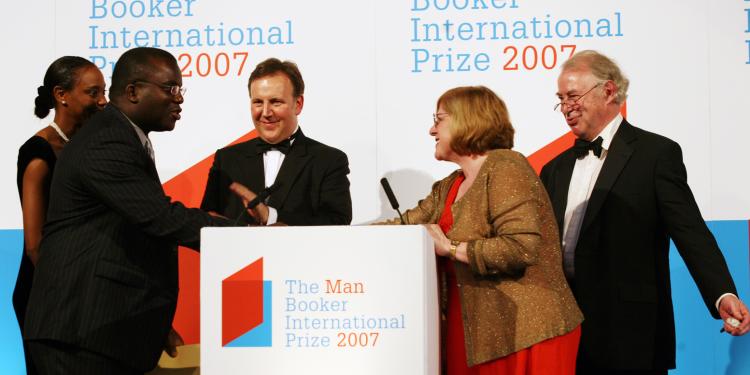

The Man Booker International Prize 2007
Chidi Achebe collecting the award on behalf of his father Chinua Achebe, 2007
Nigerian author Chinua Achebe was awarded the Man Booker International Prize for his literary career in 2007.
Achebe’s work was centred on African politics, the depiction of Africa and its culture, and the effects of colonialisation on African societies. Things Fall Apart sold over 10 million copies worldwide and has been translated into 50 languages, making Achebe the most translated African writer ever. He died in March 2013.
Achebe wrote, in addition to Things Fall Apart, more than 20 books, including: No Longer at Ease; Arrow of God; A Man of the People; Chike and the River and Anthills of the Savannah. His memoir, The Education of a British-Protected Child, came out in 2010 and his account of the Biafran war, There Was A Country, in 2012.
Upon his death Nadine Gordimer, who was one of the Man Booker International judges who awarded Achebe the prize, wrote in The Guardian that Things Fall Apart ‘is the founding creation of modern African imaginative literature’.
Winner

The 2007 judges
It means I am appreciated in certain quarters, that my work means something to people. When I started writing all those years ago, I wasn’t even aware there were such rewards. All I had in mind was to write a story, in the way that fiction can be true. I had to be honest. I was not going to be pushed around. And so, to have appreciation of any kind is wonderful.
— Chinua Achebe on winning the award.
Background
Between 2005 - 2015, the Man Booker International Prize recognised one writer for their achievement in fiction.
Worth £60,000, the prize was awarded every two years to a living author who had published fiction either originally in English or whose work is generally available in translation in the English language.
The winner was chosen solely at the discretion of the judging panel and there were no submissions from publishers.
The Man Booker International Prize was different from the annual Man Booker Prize for Fiction in that it highlighted one writer’s overall contribution to fiction on the world stage. In focusing on overall literary excellence, the judges considered a writer’s body of work rather than a single novel.














